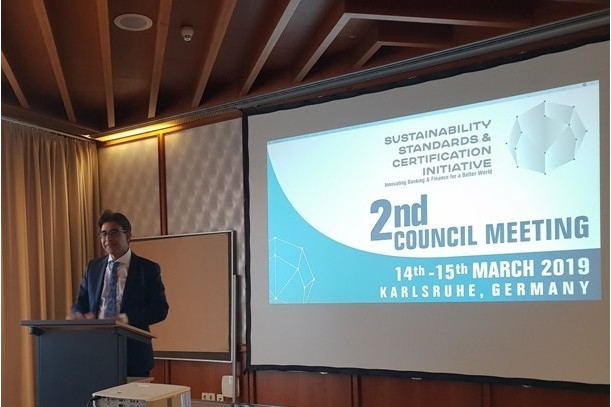Access Bank underscores sustainability leadership during high-level SSCI meeting

Summary
Access Bank is the first commercial bank in Africa to sign up to the global initiative.
The European Organisation for Sustainable Development (EOSD), in partnership with the Reserve Bank of Zimbabwe, hosted last month a virtual seminar to share experience on the implementation and benefits of its Sustainability Standards and Certification Initiative (SSCI). The webinar, which had as its theme, “Creating a Sustainable Financial Industry,” was organised to prepare banks to sign up to the holistic sustainability standards.
Banks across Africa and Asia are already implementing the standards, which EOSD says it developed for “value-driven financial institutions.”
Access Bank is the first commercial bank in Africa to sign up to the global initiative. In her presentation at the webinar, Access Bank’s Head of Sustainability, Omobolanle Victor-Laniyan, highlighted how SSCI has enhanced the implementation of sustainability at the bank by connecting its High Impact Goals to its Purpose Statement and aligning these with the bank’s product portfolio management.
Ms. Victor-Laniyan underscored the leadership of Access Bank in sustainability, highlighting the role of the bank in creating the Nigeria Sustainable Banking Principles (NSBP), now a regulatory instrument of the Central Bank of Nigeria (CBN), amongst many other local, regional and global initiatives the bank has continued to lead and support. She said Access Bank has been implementing its sustainability strategy for over a decade, winning several awards for the same.
The CEO of Uganda Development Bank, Patricia Ojangole; and Managing Director of Alliance Finance Company, Sri Lanka, Romani de Silva, also made presentations on the progress of their institutions in implementing SSCI. Representing their institutions, the CEOs and Ms. VictorLaniyan were among other members of the International Council of Sustainability Standards who attended the meeting, namely Arshad Rab, CEO, EOSD and Council Chairman; Tom Hoyem, Board Member, EOSD; Octavia Paralta, Secretary-General, Association of Development Financing Institutions Asia and the Pacific; Cyril Okoye, acting Secretary-General, Association of African Development Finance Institutions; Jesimen Chipika, Deputy Governor, Reserve Bank of Zimbabwe; and Jide Akintunde, Managing Editor/CEO, Financial Nigeria International Limited. Representatives of over 50 financial institutions also attended the virtual workshop.
Mr. Rab said SSCI was designed to enable financial institutions to be resilient to the many challenges of the world today and in the future. According to him, the challenges include rapid technological disruption, demographic shifts, fast-changing social and economic landscapes, significant changes in global temperature and extreme weather events. He also said that SSCI was designed to help institutions to be crisis-ready in the world that is prone to endemic and pandemic diseases, one of which is Covid-19 that has thus far affected over 10 million people around the world and caused serious economic devastation. Such challenges, he said, call for value-driven financial institutions that can adapt and maintain highest standards for delivering stakeholder value.
The above-mentioned challenges also require a cutting-edge framework to equip financial institutions that can lead the charge in managing risks, embracing and fostering innovation, capturing new market opportunities, and delivering economic growth that is environmentally-responsible and socially-inclusive.
Access Bank Plc has consistently demonstrated through sustainable business practices how it is delivering superior value to its customers and providing innovative solutions for the markets and communities where it operates. SSCI is being administered to pre-qualified institutions by the International Council of Sustainability Standards of the EOSD.
Related
-
Two-thirds asset managers pursue sustainable investing – Morgan Stanley
The surge in sustainable investment activity has been spurred by rising investor demand and media coverage.
-
IFC invests $11.5 billion for Africa’s green transition and job creation
IFC said it made $11.5 billion in investments between July 1, 2022, and June 30, 2023, across 40 countries, the ... -
AfDB, Africa50 secure $1 billion investment for sustainable development
The impact investment of $1 billion is expected to increase funding for sustainable development and social progress across ...










